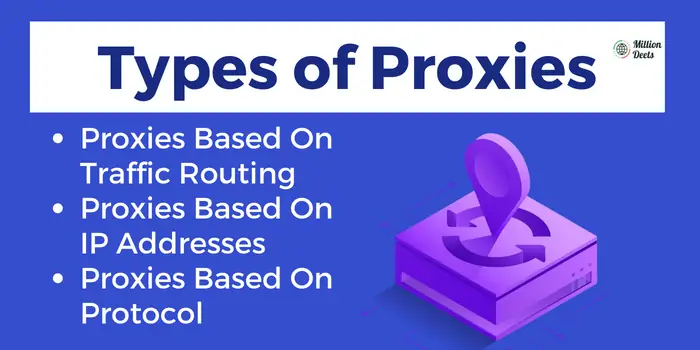A proxy server, often shortened to a proxy, is any internet-connected intermediary hardware or software that routes web requests and responses from users through itself. While the word proxy refers to all intermediaries that play the above role, there are multiple types of proxies. Therefore, in this article, we’ll discuss the various types of proxy servers as well as how they are deployed practically.
Types Of Proxies
There’re several types of proxies, which differ not only based on their practical use cases but also their characteristics. Against this backdrop, the three broad categories of proxies capture the use cases and characteristics. However, it’s worth pointing out that a proxy can fall into more than one category. These categories include:
- Proxies based on traffic routing
- Proxies based on IP addresses
- Proxies based on Protocol
Proxies Based On Traffic Routing
There’re two types of proxies servers that fall into this category:
- Forward Proxies
A forward proxy is any proxy that’s installed on the user’s computer. It forwards all web requests from the user’s computer to the target web server. This way, the requests appear to originate from the forward proxy rather than the user’s computer. In fact, as we’ll detail later, forward proxies hide the computer’s IP address and instead assign a different IP address. This intervention helps promote online anonymity, consequently helping users undertake web scraping and access geo-restricted content.
There’re several types of forward proxies, including residential proxies, data center proxies, mobile proxies, HTTP client proxies, transparent proxies, and SOCKS5 proxies (more on these proxies below).
- Reverse Proxies
A reverse proxy is any proxy that’s integrated into a web server and, therefore, sits in front of the server. It receives all incoming web requests on the server’s behalf, acting as an extra layer of protection that prevents direct access. In this regard, reverse proxies help secure the backend infrastructure. Generally, this proxy type is used in the following use cases:
- Undertaking load balancing
- Screening the incoming requests to prevent attacks
- Hiding the structure of the backend servers
- Saving/caching frequently accessed content, especially static content
- Logging incoming traffic
Proxies Based on IP Addresses
The second category is based on the type of IP address the proxy assigns as well as how they affect the assignment. The proxy types under this group include:
- Residential Proxies
A residential proxy server assigns residential IP addresses, which are associated with and registered by internet service providers (ISPs). Typically, proxy service providers enter into agreements with ISPs and their customers. This is beneficial because the web requests always appear to originate from a real user, meaning residential proxies aren’t easily blocked. However, this proxy type is more expensive because residential IP addresses are rare.
Residential proxies are generally used in the following instances:
- Large-scale web scraping
- Accessing geo-blocked content
- Ad verification
- Anonymous Browsing
- Datacenter Proxies
A data center proxy assigns data center IP addresses. These IP addresses are associated with powerful data center computers. In this regard, data center proxy servers are fast and powerful. However, they’re easily detected, unlike residential proxies. That said, data center proxies are used for the following:
- Web scraping
- Bypassing geo-restrictions
- Anonymous Browsing
- Mobile Proxies
Mobile proxies are software-based and route internet traffic via smartphones or other mobile devices such as tablets and mobile Wi-Fi routers (Mi-Fis). Given that these mobile devices are connected to the internet via mobile carriers, mobile proxies assign IP addresses from the carriers’ respective IP networks. It’s worth pointing out that ethically sourced mobile proxies involve agreements between proxy service providers and mobile device users who must install an application on their gadgets.
Mobile proxies are used for the following:
- Ad verification
- Social media management
- Review monitoring
Proxies Based On Protocol
The proxy types categorized based on the protocol include:
- HTTP and HTTPS Proxies
An HTTP/HTTPS proxy is an intermediary that routes all traffic sent via the Hypertext Transfer Protocol (HTTP) and the Hypertext Transfer Protocol Secure (HTTPS). This proxy type is created by configuring either a browser or the user’s computer in what creates an HTTP/HTTPS client proxy. Alternatively, you can configure a web server to act as an HTTP/HTTPS proxy, creating an HTTP/HTTPS server proxy.
This proxy type is used for the following:
- Caching frequently accessed content
- Content filtering
- Anonymous Browsing
- SOCKS/SOCKS5 Proxies
A SOCKS/SOCKS5 proxy routes traffic via the secure socket protocol, which sends the requests or responses via the Transmission Control Protocol (TCP) or User Datagram Protocol (UDP). It’s worth noting that SOCKS5 is a more improved version of SOCKS.
SOCKS/SOCKS5 proxies are used for:
- Peer-to-peer connections, such as torrent downloads
- Emailing
- General web browsing
- Content streaming
Also Read – How To Increase Revenue on Youtube Using Proxy?
Conclusion – Types Of Proxies
A proxy server can be of multiple types, each with its own characteristics and uses. Generally, these types are grouped into three main categories based on the internet protocol, traffic routing, and the assigned IP address. Even so, some proxies can fall into more than one category. For instance, residential proxies and data center proxies are forward proxies that are identifiable based on the assigned IP address.





